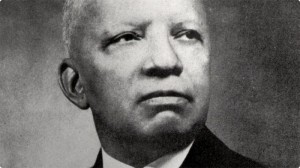
Black History Month: still relevant for everyone
As February arrives and Black History Month approaches, posters, fliers and exhibitions strewn throughout the school remind us to take time to reflect upon the past and present events that have played an integral role in shaping the current socio-cultural environment.

Created more than 80 years ago in 1926 by Carter G. Woodson, the forum known today as Black History Month was initially celebrated the second week in February and served as a means to recognize and validate the notable achievements of black Americans during times of unjust racial inequality in America.
In today’s ever-changing landscape of race relations in the U.S., there is an ongoing debate as to whether or not Black History Month is still relevant.
On one side of the fence, there is an argument that Black History Month is no longer relevant, with detractors arguing that choosing one month to honor and reflect upon black history only further marginalizes black achievements and contributions to a single month.
Conversely, supporters on the other side of the fence still believe observing Black History Month is a time to garner inspiration from the plight, perseverance and prominent achievements of black Americans.
Everette Penn, department chair of social and cultural sciences and associate professor of criminology, believes it is important to recognize that Black History Month serves as an apparatus that transcends racial identifications.
“Black history is American history, simply put,” Penn said. “If you think about the events that occurred, they make ‘us’ – the United States – what we are today. So simply because the adjective black, African-American, or Negro is in front of it – it takes nothing away from it – but it adds to what makes ‘us’ today.”
Further affirming the notion that Black History Month is not just a time reserved for black Americans, but all Americans, Penn added, “Obama is the President of the United States; he’s not the ‘black president,’ he is the President of the United States. If we went to industry, if we went to sports, if we went to entertainment, all of the people that happen to have dark pigmentation are simply Americans that have done great things.”
Furthermore, Penn reverently recognized the fact that influential black Americans can serve as role models today.
“There was a time when history had it that it was un-thought of that these activities could occur because we had segregation, Jim Crow laws etc., but we’ve passed that chapter,” Penn said. “We must always remember it, but we passed that chapter, and now there are opportunities for people to do great things no matter the color of their skin. That’s what makes America great.”
As the parent of an 8-year-old son, Penn acknowledged the importance that inspiration can serve during these current times of racial dissonance in the media.
“It is important for him to know that there are people who have dark pigmentation who have done great things,” Penn said. “I think that it is necessary because there is so much negative simply because he is an African-American boy.”
A panel discussion sponsored by the Office of Intercultural Student Services (ISS), “Shifting: Race in the 21st Century,” will be held Wednesday,

Feb. 11 at 3 p.m. in the Garden Room.
Shaun Simon, ISS coordinator of women’s and LGBT services, has arranged the university discussion panel, which will explore the ever-changing landscape of race in America.
Panelist Stephen M. Cherry, assistant professor of sociology, mentioned that a main objective of the discussion will examine the perpetual transitions and transformations occurring within the traditional ways in how people identify themselves within racial and ethnic categories.
“By 2050, the U.S. Census projects the nation will be a majority minority nation, meaning no ethnic group will be in majority and ‘so-called’ minorities will be a collective majority,” Cherry said. “’So-called’ because in terms of identity, the terms we use are becoming meaningless. How does a society hold on to racialized ideologies when we don’t have a system that is able to reflect how we see ourselves?”
The panelist will be: Cherry; Rheeda Walker, associate professor of clinical psychology and director of Culture, Risk and Resilience Lab, University of Houston; Kim Case, psychology/women’s studies professor, UHCL; and Marcia Walker-McWilliams, visiting scholar for African-American studies, UH.
For more information on the “Shifting : Race in the 21st Century” event and/or a complete calendar of Black History Month events on campus, click the link, or see list on the right.
